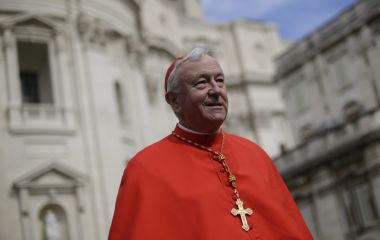Faith groups must work together in the face of 'brazen persecution' say religious leaders
In an age where people of faith are more likely to ridiculed than respected, it is all the more important for people of different faiths to stick together, Cardinal Vincent Nichols and Chief Rabbi Ephraim Mirvis wrote today a joint article for The Daily Telegraph.

Nichols, an English cardinal and president of the Catholic Bishops' Conference of England and Wales, wrote the article alongside the Chief Rabbi to commemorate the 50th anniversary of Nostra Aetate, a landmark document shifting the way the Catholic Church viewed other faiths.
The two men, regarded as the leaders of the Jewish and Catholic faiths in Britain, expressed regret at the way faith was viewed in an increasingly secular society.
"As we look around many parts of the world, we cannot help but be disturbed by what we see," they wrote.
"To confess your belief in God no longer commands universal respect for a deep commitment to a lofty ideal, self-discipline and moral conviction. In many societies you are more likely to be dismissed as naïve, unsophisticated and narrow-minded.
"As such, when a view is expressed which is informed by one's faith on issues such as assisted dying, the value of family life or social responsibility, that view is often treated with scepticism, as though it is somehow less rational or ill-founded."

However Nichols and Mirvis said that in the face of ridicule, at best, and at worst "brazen persecution," it is vital that people of different faiths work together.
"That is why it is more important than ever for faith communities like ours to cultivate close working relationships," the article continued. "We share so much in common – a great respect for the tradition that stretches back thousands of years behind us, and a determination to ensure that that same tradition will stretch out long into the future."
Nostra Aetate was one of three declarations made by the Second Vatican Council on "the relation of the Church with non-Christian religions." One of the effects was to mark a much more open and reconciliatory attitude between the Catholic Church and other faiths.
- Pope to issue post-Synod document on the 'joy of family'
- Catholic Church 'out of touch' on marriage and families, say English Catholics
- Vincent Nichols: We will rise to the Pope's challenge to host refugees
- Rabbi Sacks: 'Why did God invent atheists? To stop religious leaders from getting big-headed'
- Why the evangelical message doesn't always play well in Israel
As Nichols and Mirvis note in their article, the Church's Good Friday prayers used to include a plea that the "perfidious Jew" might be converted to "the truth". Now that same prayer beseeches God for "the Jewish people, first to hear the word of God, that they may continue to grow in the love of His name and in faithfulness to His covenant."
This marks a clear contrast in attitude and Nichols and Mirvis concluded their letter with the hope that other faith communities would follow that example.
"We pray that the normalisation of Catholic-Jewish relations in recent decades will offer valuable lessons for others around the world consumed by religious and cultural hostilities.
"Let this jubilee year in the Catholic Church be a catalyst for all faith communities who are 'on God's side' to work positively and collaboratively and harder than ever before for the sake of all humanity."











